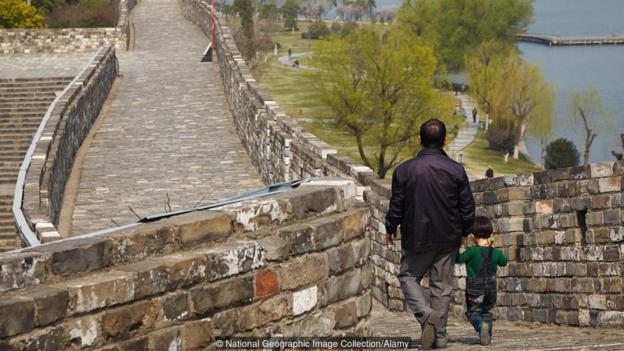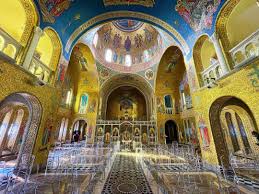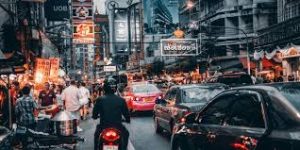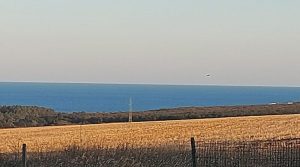China’s ancient city ‘Nanjing’ luring expats

Nanjing offers a different pace than bustling Beijing or futuristic Shanghai, but one that newcomers are happy to embrace for the peaceful trade-offs.First established as a state capital in 229 CE, Nanjing, China, has long been one of the country’s most important (and largest) inland river ports and is recognised as one of the Four Great Ancient Capitals of China. Homo erectus fossils dating around 600,000 years have been found here; and the 600-year-old stone walls that surrounded the city during the Ming Dynasty (1368-1644) still stand alongside monuments to the early Republic of China and modern skyscrapers, giving the city constant visual links to its complex and changing past.
“From low-rise Nationalist period buildings around Beijing Xi Lu, towering skyscrapers around Xinjiekou and winding alleys of shacks around old Pukou, Nanjing has a great deal of architectural variation,” said current resident and middle-school teacher Freya Drew, originally from Sheffield, England.
While this juxtaposition might seem jarring in other cities, it works in Nanjing. “Roads, often tree-lined, rise and fall within the city; old areas of housing back onto brazenly modern structures,” said teacher Ed Culham, who is from Scotland and has lived here since 2018. “While Nanjing is undoubtedly a modern city, it has an ancient feel, one where the historical site of the city renders the buildings harmonious with its natural surroundings.”
As a university city with a growing expat population, Nanjing offers a different pace than bustling Beijing (1,000km to the north) or futuristic Shanghai (300km to the east), but one that newcomers are happy to embrace for the peaceful trade-offs.Though home to 8.3 million people, Nanjing is one of the few big cities left in China to offer easy access to peace and seclusion, Culham explained. “In Pukou [a north-west district in Nanjing], a 30-minute bus ride will leave you on the edge of the Laoshan Scenic Area. This large area of forested hills has many paths and trails from where it is easy to leave the crowds behind.”
Xuanwu Lake provides a peaceful escape right in central Nanjing, with temples, teahouses and restaurants located in nearby Xuanwu Lake Park. To experience more of Nanjing’s past, Culham recommends strolling the streets of Lao Men Dong, a renovated pedestrian street just north of the Qinhuai River. One of the oldest commercial streets in the city, Lao Men Dong features classic wooden structures (renovated to look like the originals) that house souvenir shops and small restaurants serving local specialties like salted duck, meatballs and savoury pastries.It is this great variety that gives Nanjing its intrigue
Unlike city walls in Beijing or Xi’an, Nanjing’s old wall isn’t geometric and instead contours the lake and mountain areas. As a result, natural sites often appear in unexpected areas of the city. The sense of surprise delivered by these central natural expanses, like the Yangtze River, Zhongshan Mountain range and Xuanwu Lake, is what new residents love about living here.
“Living in Nanjing for me means turning away from the busy main drag, diverting down old alleyways where you can emerge to courtyards or even areas of water or forest,” Culham said. “It is this great variety that gives Nanjing its intrigue.”
Home to Nanjing University, one of China’s top ranked universities, according to The Times Higher Education Asia University Rankings 2019, Nanjing has a large student population, which means it has better-than-average nightlife for a city of its size.“There’s a great variety of cheap to expensive drinking establishments, and not just run-of-the-mill boring clubs,” Drew said. “Nanjing has a rather wild nightlife, especially amongst expats. There’s something going on pretty much every night around [the neighbourhood of] Shanghai Lu.”
The city also has plenty of low-key clubs and live-music venues “for those who prefer to steer clear of the thump of a linear baseline,” Culham said. For those who miss the foods of home, there’s no shortage of foreign restaurants and cafes that cater to expats and international students. Getting around the city is easy. Nanjing has an efficient and expansive metro system that covers most of the city, but cycling is also an option, with bike-friendly wide and straight roads.
Residents rave about how affordable Nanjing is compared to other Chinese cities, especially when it comes to housing. Rent for an 85-sq-m apartment is more than 50% cheaper than Beijing and 65% less than Shanghai, according to cost-of-living site Expatistan.com. That said, the weather can be rough in winter, since most buildings lack central heating. “The winters feel even colder due to the damp weather, and without central heating, it can get very cold inside,” Culham said. Summers are also very hot and humid.
In 1937, during the Second Sino-Japanese War, Nanjing was the site of a deadly civilian attack. Known today as the Nanjing Massacre, a significant number of civilians were killed by Japanese soldiers (the total number is still widely contested among researchers and between countries), with many more injured or raped during the six-week attack. The memory of the event and Japanese occupation still lingers with residents.
“For many people, the more recent tragedies of the Nanjing Massacre and Japanese invasion simply cannot be forgiven or forgotten, a sentiment which in some cases is passed down generations,” Culham said. “The burden of this unique history may have an effect on how all expats are seen by some in the city.”
In general, Culham notes that a certain traditionalism and conservatism can be felt more strongly here than in other Chinese cities, which can make it more of a challenge to make local friends quickly. Learning and speaking Mandarin Chinese can help with integrating into the local community, as the language and cultural barrier tends to be high.
That said, Nanjing benefits from an “established and varied expat scene”, according to Cullen, so it’s easy to make foreign friends with similar interests.





